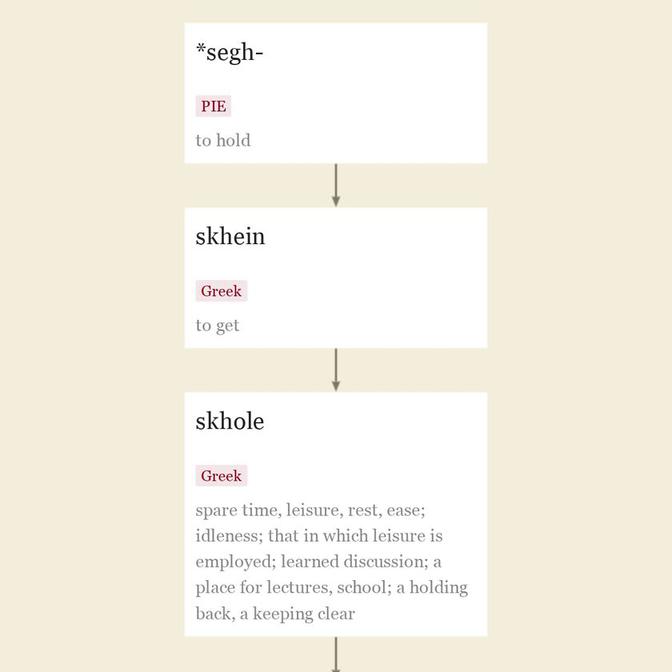old-school (adj.)
in reference to a group of people noted for conservative views or principles on some professional or political matter, 1806, from the noun phrase, "party belonging to a former time or having the characteristics, manner, and opinions of a bygone age" (1749); see old + school (n.).
Entries linking to old-school
Old English ald (Anglian), eald (West Saxon, Kentish) "antique, of ancient origin, belonging to antiquity, primeval; long in existence or use; near the end of the normal span of life; elder, mature, experienced," from Proto-Germanic *althaz "grown up, adult" (source also of Old Frisian ald, Gothic alþeis, Dutch oud, German alt), originally a past-participle stem of a verb meaning "grow, nourish" (compare Gothic alan "to grow up," Old Norse ala "to nourish"), from PIE root *al- (2) "to grow, nourish." The original Old English vowel is preserved in Scots auld, also in alderman. The original comparative and superlative (elder, eldest) are retained in particular uses.
The usual PIE root is *sen- (see senior (adj.)). A few Indo-European languages distinguish words for "old" (vs. young) from words for "old" (vs. new), and some have separate words for aged persons as opposed to old things. Latin senex was used of aged living things, mostly persons, while vetus (literally "having many years") was used of inanimate things. Greek geraios was used mostly of humans; palaios was used mostly of things, of persons only in a derogatory sense. Greek also had arkhaios, literally "belonging to the beginning," which parallels French ancien, used mostly with reference to things "of former times."
Old English also had fyrn "ancient," which is related to Old English feor "far, distant" (see far, and compare Gothic fairneis, Old Norse forn "old, of old, of former times," Old High German firni "old, experienced").
Meaning "of a specified age" (three days old) is from late Old English. Sense of "pertaining to or characteristic of the earlier or earliest of two or more stages of development or periods of time" is from late Old English. As an intensive, "great, high," mid-15c., now only following another adjective (gay old time, good old Charlie Brown). As a noun, "those who are old," 12c. Of old "of old times" is from late 14c.
Old age "period of life of advanced years" is from early 14c. Old Testament is attested from mid-14c. (in late Old English it was old law). Old lady "wife, mother" is attested from c. 1775 (but compare Old English seo ealde hlæfdige "the queen dowager"). Old man "man who has lived long" is from late Old English; the sense of "husband, father, boss" is from 1854, earlier (1830) it was military slang for "commanding officer;" old boy as a familiar form of address is by c. 1600. Old days "former times" is from late Old English; old time "times gone by" is from late 14c.; good old days, "former times conceived as better than the present," sometimes ironic, is by 1670s. Old Light (adj.), in religion, "favoring the old faith or principles," is by 1819.
[place of instruction] Middle English scole, from Old English scol, "institution for instruction," from Latin schola "meeting place for teachers and students, place of instruction;" also "learned conversation, debate; lecture; disciples of a teacher, body of followers, sect," also in the older Greek sense of "intermission of work, leisure for learning."
This is from Greek skholē "spare time, leisure, rest, ease; idleness; that in which leisure is employed; learned discussion;" also "a place for lectures, school;" originally "a holding back, a keeping clear," from skhein "to get" (from PIE root *segh- "to hold") + -olē by analogy with bolē "a throw," stolē "outfit," etc.
The basic sense of the Greek word is "leisure," which passed to "otiose discussion" (in Athens or Rome, the favorite or proper use of free time), then it came to be used for the place for such discussion.
The Latin word was widely borrowed (in addition to Old French escole, French école, Spanish escuela, Italian scuola; Old High German scuola, German Schule, Swedish skola, Gaelic sgiol, Welsh ysgol, Russian shkola).
The meaning "students attending a school" in English is attested from c. 1300; the sense of "school building" is by 1590s. Sense of "people united by a general similarity of principles and methods" is from 1610s; hence school of thought (by 1848). As an adjective by mid-18c., "pertaining to or relating to a school or to education."
School of hard knocks "rough experience in life" is by 1870; to tell tales out of school "betray damaging secrets" is from 1540s. School-bus is from 1908. School days is from 1590s. School board "local committee of education" is by 1836; school district "division of a town or city for the management of schools" is by 1809.
Trends of old-school
More to Explore
updated on August 20, 2019
Trending words
Dictionary entries near old-school
olde
olden
old-fashioned
oldie
oldness
old-school
oldster
old-time
old-world
ole
oleaginous

